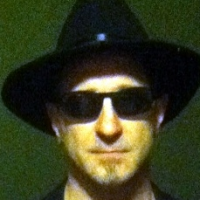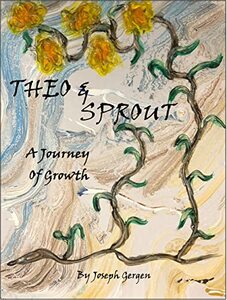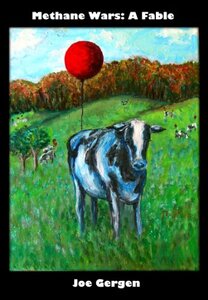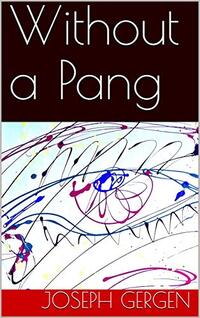Joseph Gergen Interview Published on: 20, Sep 2022
 What is the name of your hometown and what was the street where you grew up called?
What is the name of your hometown and what was the street where you grew up called?
I grew up in a little town called Minot, named after a fellow no one has ever heard of who worked for the great railroad baron James Hill. The city was referred to as the Magic City, not because it was some fantasy village but because it had sprung up so furiously fast along the great railroad line heading west through the US. The street I grew up on was “Normal Street”, which has always been a good joke since I have been many things except normal.
Did you ever dream of becoming an author?I did when I was young, but I’m not sure if I understood what that meant at the time. When I was young I liked to write poetry (which might have been slightly saccharine). I then went on to write a fantasy novel and a children’s book. They were terrible. After that, I put thoughts of writing on hold and thought perhaps I should live a bit first. I eventually came back to writing and so here I am.
What do you enjoy the most about writing literary fiction? Why did you choose this genre?I think the genre chose me. I’m not a gifted story teller so I was going to fail at other genres that required well thought out plots. So my stories have become more and more character driven. I let the characters dictate the story. I enjoy not having that burden be on my shoulders. Ha!
If you had to choose any other career, what would you pick and why?An architect. I would have liked to design homes that would enable people to be themselves. I think I am drawn to this idea because years ago I read a wonderful book called “The Timeless Way of Building.” It was basically a book that tried to capture why some spaces were more alive than others and how you could use that knowledge to create spaces that were alive too.
What are some great books you've read recently and who wrote them?Right before I wrote “Theo and Sprout”, I read “The Book Thief,” by Markus Zusak, which completely engrossed me. While it didn’t inspire the story in “Theo and “Sprout,” it did inspire to want to write a book that had impact like that.
Could you tell us a little about your book "Methane Wars: A Fable" and what it means to you?“Methane Wars” started out as a desire to take a silly, outrageous premise and treat it as dryly as possible. Perhaps as an ode to famous satires such as “Animal Farm” or “A Modest Proposal.” But what it turned into was an allegory/fable on how things can quickly spiral out of control and all the unintended consequences that can creep out of the woodwork.
What does a normal day in the life of Joseph Gergen look like? On a normal Friday or Saturday night, are you more of a "hit the bar" kind of person or a "stay in and watch Netflix in stained pajamas" kind of person?I don’t think I own any pajamas, not that anyone wants to know that. I spend my days trying to manage my ebbs and flows of mental energy. Slowly learning not to fight with them and find a way to manage at least one creative effort a day. I didn’t have a television for many years but have one now and have discovered Netflix, or more accurately I have discovered K-dramas on Netflix.
What kind of research was involved when you were writing "Theo and Sprout: A Journey of Growth"? Who are some of the most interesting people you met while doing this research?Oddly enough most of my research was around the Jungian concept of the Anima/Animus and the concepts of the Divine Feminine. Sprout is essentially Theo’s Anima come to life. Almost all of the chapters have thematic connections (however subtly) to one of the traits associated with the Divine Feminine. Sprout could also be viewed as Theo’s bridge into the collective unconscious.
Who inspired the character of Dinn?I was inspiration for Dinn in “Without a Pang” from the initial standpoint of being burned out by my career (though an unrelated career) and looking for a solution. He morphed into his own person as I developed him and he took on the role of the crusader (of which I am certainly not). Dorian then developed as essentially Dinn’s alter ego, or from a Jungian perspective, his shadow self, and went places Dinn could or would not.
What are some common marketing traps a lot of new authors fall into? Any advice on how to avoid them?I’m a terrible marketer so I think I should be the last person to comment on this. The one thing I am slowly learning is that in the digital world, I can get past my anxiety of self-promoting because at worst it is a tree falling in an empty forest.
Are you, friends, with other authors? If so, how have they helped you in your journey as a writer?I’m pretty introverted so I don’t have a large social circle, and it doesn’t include any authors. But, I do have a friend who I paint with who is bold and daring in his creative approach, and he’s taught me there’s no reason to leave anything in the tank. Oddly enough, though I am a painter, my books are pretty sparse on vivid descriptions. I haven’t quite reconciled that yet.
Is there a certain type of scene that's harder for you to write than others (sad scenes, action, racy, etc)?Scenes where the main character is vulnerable, since I am putting myself in their shoes and have to feel vulnerability as well, which is very draining for an empath. That was what made writing “Theo and Sprout” so hard and rewarding: it was filled with vulnerability.
How often do you write in a week? Do you prefer writing in the day or night?When I am in the process of writing a book, I try to write everyday (which obviously isn’t always possible sine I have a full time job that gets in the way). But that consistency builds momentum. It’s kind of a boring routine to be honest. I can pretty much only write mid-morning or early evening, at other times my brain just isn’t interested in focusing that hard. I usually take long breaks in between drafts to clear the air. I think an interesting thing though is that when I am not working on a book, I don’t really do much writing. I spend my time on other creative activities, like painting, or attempting to fill my mind with new source material, which I tell myself sharpens the creative process for use when I return to writing.
What are your plans for the future? Where do you see yourself as an author in 10 years time?Gads, I can’t think past tomorrow. Instead what I hope/wish for is to not be afraid to make bold and unanticipated decisions along the journey to lead me somewhere unexpected. Thinking of a specific future would limit me to what my small imagination could conjure. As some famous guy would say “There are more things in heaven and earth, Horatio, than are dreamt of in your philosophy.”
On a scale of 1 to 5, how helpful do you think AllAuthor has been to you? What are some things you like or dislike about the site?I’m not very good at rating things. I’ve gotten a lot out of the site. I like having a profile and like to look at the profiles of other authors, makes them more human.
Share Joseph Gergen's interview
Joseph Gergen grew up in a little town called Minot. He liked to write poetry when he was young. He has pursued writing, painting, and furniture making. He is the author of Theo and Sprout. He is a brilliant and clever writer who effectively and skillfully writes his stories after extensive research.




